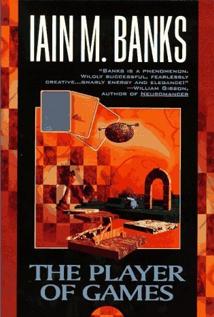
I really liked this book. Far more than Consider Phlebas.
In a nutshell, the story follows Jernau Gurgeh, one of (if not the) best ‘Player of Games’ in the entire Culture. We had a hint of how important games could be in Consider Phlebas, with the stakes literally being life and death (although not of the player, /of course/), but here we see it can be so much more.
And Gurgeh is really into games.
I get that. I appreciate that. Games have this special spot in the universe. A microcosm of all that can be, following very specific and often completely knowable rules. It’s a way to compete (or co-operate (or both)) with other game players, to get to know them and the game you’re all playing together. Sometimes, it’s all about winning… but sometimes it’s so much more.
And Gurgeh gets that.
So when he’s offered (when Special Circumstances offers… you accept) to travel two years, almost out of the galaxy, to visit an alien empire where there is incredibly complicated thousand year old game that essentially dominates their entire society–choosing their leaders, guiding their religious views.
Oh, I love it.
I’ll leave the detail there, but the entire idea that a not entirely likeable (especially at first) player of games can be the protagonist. Oh, that’s just lovely.
Easily my favorite book of the Culture so far (even if I’ve only read the two so far 😄). I really will have to check at the end if it stands up.
Worth a read.
All reality is a game. Physics at its most fundamental, the very fabric of our universe, results directly from the interaction of certain fairly simple rules, and chance; the same description may be applied to the best, most elefant and both intellectually and aesthetically satisfying games. By being unknowable, by resulting from events which, at the sub-atomic level, cannot be fully predicted, the future remains makkeable, and retains the possibility of change, the hope of coming to prevail; victory, to use an unfashionable word. In this, the future is a game; time is one of the rules. Generally, all the best mechanistic games - those which can be played in any sense “perfectly”, such as a grid, Prallian scope, ’nkraytle, chess, Farnic dimensions - can be traced to civilisations lacking a realistic view of the universe (let alone the reality). They are also, I might add, invariably pre-machine-sentience societies.
The very first-rank games acknowledge the element of chance, even if they rightly restrict raw luck. To attempt to construct a game on any other lines, no matter how complicated and subtle the rules are, and regardless of the scale and differentiation of the playing volume and the variety of the powers and attibutes of the pieces, is inevitably to schackle oneself to a conspectus which is not merely socially but techno-philosophically lagging several ages behind our own. As a historical exercise it might have some value, As a work of the intellect, it’s just a waste of time. If you want to make something old-fashioned, why not build a wooden sailing boat, or a steam engine? They’re just as complicated and demanding as a mechanistic game, and you’ll keep fit at the same time.